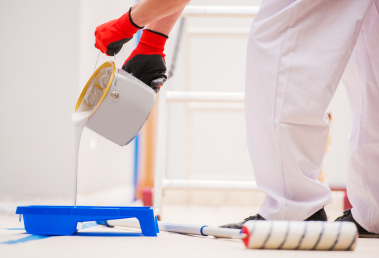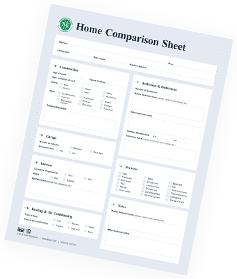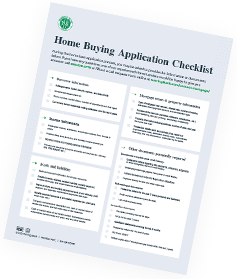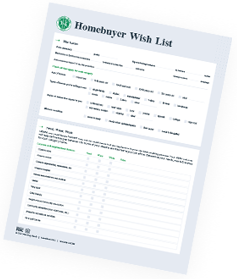Buying a home is a big commitment, one that takes time, energy, and money.
However, what many people don’t realize is that they ARE financially qualified to get a home loan. If you’ve been responsible with your money and have been steadily working to improve your financial stability, now is the perfect time to take the first steps towards home ownership.
1. Are you ready to take out your first mortgage?
2. Buying vs renting: the smarter financial decision
3. How to prepare and start saving to buy a home
4. Here’s what the home buying process looks like
5. Here’s everyone who is involved in the home buying process
6. Everything home buyers should know about realtors
Here are the signs that you’re ready to take out your first mortgage.
You’ve paid off your debt and have a solid credit score
One of the biggest signs that you are ready to take out a mortgage is that you have paid off most of your debt.
If you’re still struggling with student loan payments, car payments, or credit card debt, you should prioritize those before taking out a mortgage.
If you’ve lowered your debt and have a strong credit score, you are probably a great candidate for a home loan.
You are able to save money and make a down payment
Another key sign that you are ready to buy a house is that you have consistently been able to save money over the last few years.
If you have developed a habit of putting away money after paying your essential expenses each month, there’s a good chance you have enough saved up to make a down payment on a home.
Down payments vary depending upon the price of the home and the type of loan. Keep in mind, there are other costs associated with buying a home, such as closing costs and repairs along the way.
You have a stable career and goals for the future
You should have a steady, reliable income when you are ready to buy a home. You should be able to predict to a certain extent what your budget is going to be and feel confident that you can afford the mortgage payments.
As ready as you think you are to take the plunge into home ownership, it’s always worth taking one last look at the pros and cons of buying vs renting before you make a final decision.
Buying vs. Renting: The Smarter Financial Decision
If you’re renting an apartment or home, you may think you’re saving money each year.
Buying a home costs money after all — sometimes a lot of it. But contrary to what many people believe, renting is not always cheaper than buying a home, and certainly isn’t a better way to use your money to your advantage.
Surprised? Let’s talk about why buying a home can save you money in the long run.
Why You Should Buy
Renting has a few pros on its side, but not when it comes to money. Here’s why:
You never get your rent money back
Even if you’re lucky enough to have very low rent, the money you pay your landlord every month is still money you will never see again.
Pro to buying: You’re Building Equity
When you make payments on a mortgage loan every month, those payments go back into the value of your home, building up equity.
That’s equity you can actually use when you sell the home, or for collateral on a loan or a second mortgage if you need one.
The equity you build up in a property is real, tangible, and can be of incredible value to you when the home is paid off.
Con to buying: You Have To Come Up With A Down Payment
Even though the down payment is part of that equity, it’s usually a lot of money to provide upfront, especially when you’re already pouring money into rent every month.
Even if a bank offers you a mortgage that requires less than a 20% down payment, a smaller fraction of a lot of money is still a lot of money.
Saving for a down payment on a home purchase is a big financial commitment, and might mean making changes to your budget and lifestyle that are not comfortable or pleasant for you.
Pro to buying: Your Rent Will Never Go Up Again
As long as you have a fixed rate mortgage with a reputable lender, you will never pay more per month than you do for your very first monthly mortgage payment.
Landlords have the liberty to increase rent every time a lease is renewed.
A mortgage payment, on the other hand, stays exactly the same for the life of the mortgage.


Updating a Purchased Home Pays for Itself and Then Some
When you update your bought home, it raises its value.
This equates to more money should you decide to sell. Also, if you plan to refinance, you’ll get more equity when your home is appraised.
Update your rental and the only person you’re helping is your landlord.
Pro to buying: Home Ownership Gives You Freedom
Maybe you want to replace all of your stairs with amusement park-worthy slides, adopt 17 rabbits from the local shelter, or paint every wall a different color. Perhaps you’d love to build a massive fire pit in the backyard or install a custom dishwasher from Luxembourg in the kitchen.
Whatever your unique plans may be, chances are they will not be part of any lease agreement.
When you own a home, you can do whatever you like with the space. You are your own landlord. As long as you don’t do anything illegal or endanger your neighbors, your home is your oyster.
Con to buying: You’re Responsible For Damage And Repairs
If you’re renting an apartment, there’s probably a maintenance number you can call if your ceiling starts to leak or your toilet won’t flush.
When you own your home, you don’t have that lifeline.
Almost All Homes Gain Value Over Time
As long as you take care of your purchased home, its value should increase as time goes by.
This means when you go to sell, you’ll likely sell for more than what you paid for.
How to prepare and start saving to buy a home
Yes, you do need to have saved up some cash before you can buy your first home.
Saving up to buy a home may seem impossible, but it’s not! It can be done, and it can be done sooner than you think.
The most successful way to save for a home is to follow a savings plan.
Here are a few things you’ll need to prepare for
Knowing what you need to prepare for, here are the steps you need to take to start saving up for a home
#1: Determine What You Need
Ask yourself this: how much do you need to save to buy the house you want?
At a minimum, you will need to save enough to cover a down payment and closing costs. Down payments are calculated by a percentage of the loan amount.
Calculate the down payment percentage plus the closing cost percentage (we recommend 5% to be safe) of various home prices to help you determine how much you’ll need to save.
Here’s an example of a down payment and closing cost calculation for a $200,000 FHA loan: $200,000 x .035 = $7,000 for the down payment, plus $200,000 x .05 = $10,000 for closing costs (highest estimate).
Total, you should save at least $17,000.
Of course, a cheaper home and lower closing cost percentage will give you a lower minimum savings estimate.
Determine how much home you can afford using this handy mortgage affordability calculator.
#2: Pay off your small debts
Before you can truly begin saving, you need to pay off your small debts— meaning your high interest credit cards.
Throw as much money as you can at credit card payments each month and whittle them down until they’re gone. If you can, transfer all debt to the card with the lowest interest rate.
#3: Open a savings account.
If you haven’t done so already, open a savings account.
Each month, determine your minimum monthly budget (cost of rent, bills, living expenses, etc.) and put the rest into savings.
The idea behind a savings account is to make the money more difficult to access and spend like you would from a checking account. Pretend like the savings account doesn’t even exist, unless you’re putting money into it, of course.
After all, savings accounts are for SAVING, and money should only come out of it for emergencies or to pay for something big, like a house.
#4: Cut out unnecessary spending
Unnecessary spending happens in a variety of ways.
Here are some examples:
• Subscriptions and memberships – Music and TV steaming services, meal delivery services, subscription boxes of goodies, memberships to organizations or clubs, etc.
• Dining out – Fast food trips, daily coffee shop runs, eating at restaurants more than once or twice a week… these costs add up quickly! Make your meals at home.
• Shopping – Do you really need that new watch or purse? Be sure to avoid impulse buys, too, like that candy bar at the check-out line or the $5-or-less section of Target.
• Cable and unlimited data plans – How many channels do you actually watch on TV? Chances are, you don’t need 500. Could you lower your data plan and use WiFi instead?
Remove all redundant spending and keep only what you absolutely need. Do this and your savings account will start to swell.
#5: Apply for down payment assistance
Yes, it’s actually a thing, and most of the time it doesn’t have to be paid back if you meet certain criteria.
HUD lists many down payment assistance programs on its site, but there are many (hundreds even) that aren’t listed. You just have to look a little harder. Try both terms when searching:
• Down Payment Assistance
• First Time Homebuyer
You’ll be surprised what you find. Much of what will come up, though, will just be small loans with high interest rates. You don’t want those. To weed them out, look for government-run websites.
Okay, so, you’re done renting, your debts are under control, you have a steady reliable budget… you’re ready.
Here’s what the home buying process looks like
If you know what to expect before going into it, you’ll have a much smoother experience.
To help prepare you for the home buying journey, here are the key steps involved in the process.
#1: Determine How Much You Can Afford
Before you start looking for a home, it is important to determine how much you can actually spend.
You can get a broad estimate by using our Mortgage Payment Calculator.
For a more precise number, we recommend getting pre-approved for a mortgage. To get pre-approved, your lender will ask you to provide some financial information, such as your income, debts, assets and liabilities.
The lender will review these items, along with your credit score, to determine how much they can lend you. Doing so will not only help you determine what you can afford, it will also help you present a stronger offer when you find the home you want to buy.
#2: Gather All Relevant Documentation
When you begin the home loan process, make sure you have all of the important information readily at hand.
Take a look at your credit report to make sure there are no major issues before your lender runs a credit check.
When preparing to speak with your loan officer as a first time home buyer, make sure you have your bank statements, pay stubs, and tax returns on hand.
#3: Get Pre-Approved and Apply
After you find a home loan lender, it’s time to start the application process and get pre-approved.
Based on your credit, different options will be available to you affecting the amount you can take out and which homes you will be able to consider for purchase.
Knowing what you’re pre-approved for will help you when you start shopping for your new home loan, and help you realistically stay realistic with your expectations as a first time home buyer.
#4: Do the Math
It is important to make sure you are getting the best deal with an interest rate that works for you on your home loan.
Just like with any purchase, do not take the first offer that comes your way, and compare prices of different lenders to find the best deal.
If you are not happy with the options available to you, it might be worth holding off for another year to build up your credit score.
#5: Preliminary Research
Start by searching the web and looking at newspapers for real estate listings in your area. Keep an eye on homes you are interested in and see how long they stay on the market.
Also, be sure to note any changes in asking prices.
This step will help you get a better sense of the housing trends in your area. Remember: Research is not only crucial at the beginning of your home buying journey; it is also important to do at various stages throughout the process.
#6: Work with a Knowledgeable Real Estate Agent
A real estate agent can provide you with helpful information about the best homes in your market, including details that aren’t easily accessible to the public.
They should be able to match the expectations you have for your new home with your pre-approved home loan budget.
When you are choosing a real estate agent, make sure you feel confident in their knowledge of the home buying process and their communication and negotiating skills. Different agents may specialize in different kinds of homes or focus on certain neighborhoods.
Ask around for recommendations or look up reviews on realtors in your area to find the best fit.
Worried about the cost of an agent? Don’t be. Real estate agents are compensated by the seller of the house.
#7: Get Your Priorities Straight
While your ultimate dream home might still be a few years off, there’s no reason you can’t get all features that you consider to be essential right now.
It’s about knowing what you can’t live without and what you can compromise on.
For most people, neighborhood, square footage, and number of bedrooms are often non-negotiable. Decide where you can be flexible.
Is the home’s age or lack of granite countertops deal-breakers for you?
It might be worth it to you in the long run to stay within your budget and sacrifice some of the luxuries and updates.
#8: Begin Shopping for Homes
Utilize sites such as Zillow and Realtor.com to find hundreds of homes for sale in your area.
Sites like these also allow you to narrow your search by price range, neighborhood, and qualities of the home. You can even subscribe for weekly updates on new listings that meet your specified criteria.
When you’re ready to see some homes in person, your real estate agent can facilitate the viewings.
#9: Make an Offer
Once you’ve found a home that meets all your needs, the next step is to make an offer.
Your real estate agent will help you determine an offer price and will manage all the necessary paperwork.
Before you close the deal, you will need to get the home inspected by a reputable home inspector. The inspector will check for signs of structural damage to ensure your dream house is in good condition.
If you receive a home inspection that suggest some repairs, you can often negotiate with the seller to do the repairs prior to finalizing the deal.

#10: Complete formal mortgage application
When you have found your preferred home and completed the inspection, the next step is to complete the formal mortgage application with the lender.
When completing your application, you will be asked to provide a wealth of information and documents such as recent bank statements, previous two years tax returns, and employment details (to name a few).
If your mortgage application is approved, your lender will arrange for a home appraisal. The appraisal is used to determine whether the home’s contract price is appropriate given the home’s condition, location, and features.
#11: Coordinate the Paperwork & Close the Sale
Once all the above steps have been completed, your lender will arrange for a title company to handle all the paperwork to make sure the closing process goes smoothly.
At closing, you will sign all the paperwork required to buy the home and provide a check to cover the closing costs.
Learn more about closing costs, here.
As soon as the paperwork is signed and the check is delivered to the seller, you’ll be set to move into your new home!
Here’s everyone who is involved in the home buying process
If you thought it was just going to be you, the seller, and your bank, think again.
Because there are so many parties involved, you should know who you’ll be working with so you have a smooth buying experience.
Here’s a quick snapshot and description of everyone with whom you’ll be working when you buy that perfect home.

Realtor
Realtors get homebuyers inside homes so they can do initial walkthroughs.
When the buyer is ready to make an offer, they research recent comps so the buyer can make a reasonable offer. When the buyer is ready, realtors prepare the necessary paperwork and submit the offer to the seller.
Realtors are the point of contact throughout negotiations, and are also responsible for initiating home inspections and appraisals. Realtors are with buyers throughout every step of the home buying process, including closing.
Loan Officer
Loan Officers are skilled in communicating trust and confidence while analyzing a client’s financial status, credit, and property to determine the proper product to successfully meet guidelines as well as the needs of the applicant.
A Loan Officer educates and guides the mortgage client through the mortgage approval process, from preparing the loan application all the way through closing, and beyond.
Appraiser
Appraisers are hired by the buyer’s lender to determine a home’s value.
They systematically evaluate both the home’s interior and exterior conditions, and compare it to other homes in the area. If the home appraisal is less than the asking price, the mortgage lender will not approve the loan.
Inspector
A home inspection is similar to a home appraisal, but generally a home inspector goes more into depth.
Home inspectors are only scheduled once the seller has accepted a buyer’s offer, and are typically scheduled by the buyer’s realtor.
A home inspector submits a detailed report to the buyer after reviewing the home’s:
• HVAC
• Electrical Systems
• Plumbing
• Doors
• Windows
• Roof
• Foundation
• Floors
• Basement
• Attic
The report outlines the home’s condition and explains what work it needs now or in the near future. It is the buyer’s responsibility to pay for a home inspection, regardless of the results.
After reviewing the inspector’s report, it is quite common for buyers to renegotiate the selling price with the seller.
Title Company
A title company ensures that a property’s title is legitimate— meaning it guarantees that the seller legally owns that particular piece of real estate and can legally sell it.
This is done so that once the buyer purchases the property, he or she is rightful owner and no one else can claim it. A title company brings all of the necessary paperwork to closing so the title of the property can legally be transferred from one owner to the next.
Insurance Company
When you buy a home there are three types of insurance to be aware of:
• Title Insurance protects the home buyer should there be any legal dispute over the property.
• Homeowners Insurance protects the homeowner should anything happen to the property, such as storm damage, fire damage, or theft. Home insurance is required by the mortgage lender.
• Private Mortgage Insurance (PMI) protects the bank should the home buyer stop making payments on it. Certain loans and conditions determine whether PMI is required.
Everything Home Buyers Should Know About Realtors
So that you know what you’re getting into, we’ve taken the time to explain what realtors do and what you should expect to receive from their services.
As they say, you don’t know what you don’t know, and when it comes to realtors, you should know what to expect.
How Much Does a Realtor Cost?
Buyers don’t pay a realtor’s commission. Sellers cover that cost at closing.
Typically, realtors charge 3% of the purchase price (so with a listing agent, the seller would pay 6%).
Realtors aren’t entirely free for home buyers, though.
As the buyer, you’re essentially still paying for a realtor’s services, but the fees are either wrapped into the closing costs or negotiated into the final price of the home. To learn more about closing costs, read this article.
What Does a Realtor Do?
Realtors primarily research.
They research recent ‘comps’ (sale comparisons) to know what houses in each area should realistically sell for, as well as neighborhood statistics, future development projects, and likely insurance needs for certain houses.
They research everything the home buyer needs so he or she can make an informed purchase decision.
Aside from the research they do, realtors also open houses for walk-throughs, handle the paperwork required to make an offer, manage negotiations with the seller, and serve as a valuable resource throughout the home buying experience.
A good realtor will certainly earn their keep.
How Do You Find a Good Realtor?
To find the best realtor, you should do more than perform a quick Google search.
Call multiple realtors in your area and conduct over-the-phone interviews before you choose an agent. Ask them the following questions:
• How many clients to you presently have?
• How long have you lived in the area?
• How long have you been a realtor?
• Do you have another job?
• Can you provide recent client references?
• Do you require me to sign a buyer’s agent agreement? If so, how long is it?
• What sort of fees do you charge?
• Do you work with a team?
• When is the best time to contact you?
• How long will it take for you to get back to me?
• What makes you the best choice?
You want a realtor who knows your purchase area like the back of her hand, and who has been a realtor for several years.
You DON’T want a realtor who has limited availability. For example, if they say they’re only available between 9 AM – 5 PM on Monday – Thursday, that should be a red flag.
Time is often of the essence during your home buying journey so a high level of responsiveness and attention to your needs is crucial.
First, Get Pre-approved
Before you find a realtor, get pre-approved with a mortgage lender.
You need to know exactly what you can afford before you start shopping. This way you and your realtor can really zero in on the right houses for you and your family.
So, you know you’re ready to buy.
You have a grasp on the process.
You have an overview of the people involved.
You’re feeling good about being able to find a realtor.
Now, you just need to…
Match your budget to your perfect first home!
As a first-time home buyer, you should make it your #1 priority to shop within your budget.
Even if your budget won’t support the literal home of your dreams, you can still buy a great first home with an affordable mortgage payment.There are plenty of ways to turn your first home into a dream home over time, while building equity along the way.
Here are a few strategies to help you match your budget to your perfect first home.
Know What You Need and What You Want in a Home
Some features are going to be essential in your new home.
Perhaps you absolutely need a garage for your car or a basement for storage. Maybe your internet requirements for work rule out some older buildings.
Be careful, though, not to confuse things you need with things you simply want. As much as you might want an extra bedroom for a study or to house occasional guests, you can probably make do with a nook for a desk and a sofa bed in the living room. You might love the idea of a large balcony, but you can still enjoy the summer sun with a small deck or backyard.
Save money by eliminating the features you don’t really need, then channel those savings into finding the very best of the things you deem essential.




Find A Fixer-Upper Within Your Budget
Repairing a home costs money, but it almost always costs less than purchasing a house in perfect condition.
The willingness to consider buying a house that needs some TLC can open up options in neighborhoods you otherwise couldn’t afford or earn you some valuable extra square footage.
Take advantage of local contractors and suppliers to get good quality repairs and materials without breaking the bank, or, if you’re handy with a set of tools, you can save even more money by doing some of the repair work yourself.
A house that needs some work isn’t just a prudent investment, it’s an opportunity to indulge your inner architect and turn your home into what you dream of.
Find A Neighborhood on the Upswing
The wealthiest parts of town are usually expensive, and the most affordable parts of town may have higher levels of crime and violence.
An area that’s about to go from poor to rich – called a “transitional neighborhood” – represents a great opportunity to become part of a nice neighborhood before the prices catch up.
Predicting which areas are really about to turn it around can be hard, but certain signs are a good indication that an area is gentrifying. Coffee shop culture is one sign. A vibrant arts scene is another.
Upmarket chain stores like Starbucks often move into transitional neighborhoods, so the property near a brand new shop is a great place to look for a home that has a downmarket price, but upmarket value.
And finally… before you start looking, you should know how to navigate the market.
Navigating Buyer’s, Seller’s and even the off-market
If you’ve heard the terms ‘buyer’s market’ or ‘seller’s market’ and not fully understood what they meant, you’re not alone.
Until you’ve bought or sold real estate, there’s little reason for you to think about such things.
However, if you’re about to buy or sell a home, it’s time to learn. Here’s what you need to know.
If you find yourself in an off-market or in the off-season – there is an advantage
You might think that buying a home in the off-season would be counterproductive to your interests, but the opposite is actually true.
Buying a home during the fall and winter months can be greatly to your benefit!
Here’s why.
Give it a shot!
As long as you don’t settle, you have nothing to lose by shopping during the off-season. Buy only what you love and you’ll have no regrets!
You are here
Before you start


The Herring Bank Mortgage Team went above and beyond to ensure a seamless buying experience. I knew my loan would be a difficult one to get done and they made it seem easy.











